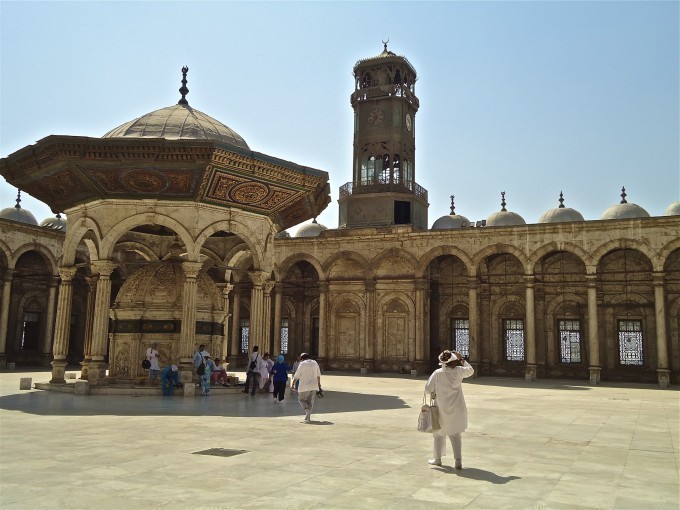‘Purification is Half of Faith’
Illustrated by IMAN SEYAM

Throughout time, Man has always reflected on the religious/spiritual dimensions of the human body. The expressions or manifestations of faith throughout the body have always been integral parts of most religions, whether it be the physical immersion in water of baptism, meditation in Buddhism or, as explained in this article, the wudu in Islam.
Wudu is a ritual ablution practiced by Muslims all over the world. It is extremely important in Islam because it is an obligatory act that precedes the most important act of daily worship Muslims do: prayer. It is an outward purification carried out in the manner below, according to the Sunnah, the teachings and practices of Prophet Muhammad, peace be upon him:
1. Having the intention of performing wudu (for intentions are most important in every aspect of Islam)
2. Saying Bismillah, or “In the name of Allah”
3. Washing both hands three times up to the wrists starting with the right
4. Rinsing mouth three times
5. Rinsing nose (by sniffing water and blowing it out) three times
6. Rising the face three times (some include ears in this step, others pass wet fingers after step 8)
7. Rinsing arms from wrists to elbows three times starting with the right
8. Passing wet hands over the head
9. Rinsing both feet up to ankles starting with the right foot
10. Reciting the Shahada or “I attest (bear witness) that There is no god but God, Muhammad is the messenger of God”
Besides these mandatory steps which, according to Islam, one must follow in order to reach physical purity, there are other steps that can be and often are added to the ritual. (Some believe that these added steps are necessary as well.) These steps include:
• Not wasting water
• Performing ablution in a clean space
• Brushing teeth (in the times of the Prophet (pbuh), and even sometimes today, a Miswak, or "traditional alternative to the modern toothbrush" was used)
Since wudu is a state of physical purity, it is not dependant on any time factor: your wudu does not last a certain period of time but is rather dependant on bodily factors. In fact, wudu is cancelled and must be repeated after any of the following:
1. Natural discharge (urine, stool, passing wind)
2. Flow of blood or pus from any part of the body
3. Full mouth vomiting
4. Falling asleep
The importance of this outward purification is shown in various passages of the Quran:
'Surely Allah loves those who turn much to Him, and He loves those who purify themselves' (2:222)
and in the Hadiths (compilation of texts which recount the teachings and way of life of Prophet Muhammad, peace be upon him)
'Abū Mālik said, that the Messenger of Allah, peace be upon him, said
“Purification is half of faith.”
(recorded in Muslim)
Jābir said, The Messenger of Allāh, peace and blessings of Allāh be on him, said:
"The key to paradise is prayer and the key to prayer is purification."
(recorded in Tirmidhi)
These passages stress the importance of purification and cleanliness, and the implications are clear: inward purification, or the purity of faith, is the real aim, but a pure, clean body is a necessary preparation for it. It is not only intended to direct attention to the purity of the soul but also to ensure constant purification of the body, which is in itself a great necessity of life, for the individual who purifies him/herself five times a day would doubtlessly be in a constant state of physical purity.
As you can see, even though physical cleansing has always played an important role in human life, it has never been as fully incorporated and considered as an integral part of faith as it is in Islam.
* Note that God and Allah are used interchangeably in this text, as Allah is the Arabic term for God. Muslims prefer using Allah because it is “absolute”; it is beyond masculine and feminine (vs. god and goddess), cannot be turned into plural (gods), etc.

Comments
kadijah
December 6, 2012I totally agree with this idea of inward purification. What a beautifull topic Sumaya. As a muslim I think is a great job you have done to go in depth explaining the benefit of taking ablution(wudu). A muslim s prayer will not be accepted by the almighty Allah if the ablution is not done properly. And as mentioned Sumaya one should follow and respect the above steps and make sure that the private parts( pubis) are clean from urine, feces,and mentruation. Most importantly, one should wash janaaba ( way of clean body) after intercourse before taking ablution. Wudu is not only a practice for praying but it helps a lot in cleaning the body and mind from shaitan( devil).
DeborahColo
February 21, 2013I like to visit such places an know about them too in details and their history.
<a href=“http://www.office-bargains.com”>Read here</a>
You have to be registered and logged in in order to post comments!